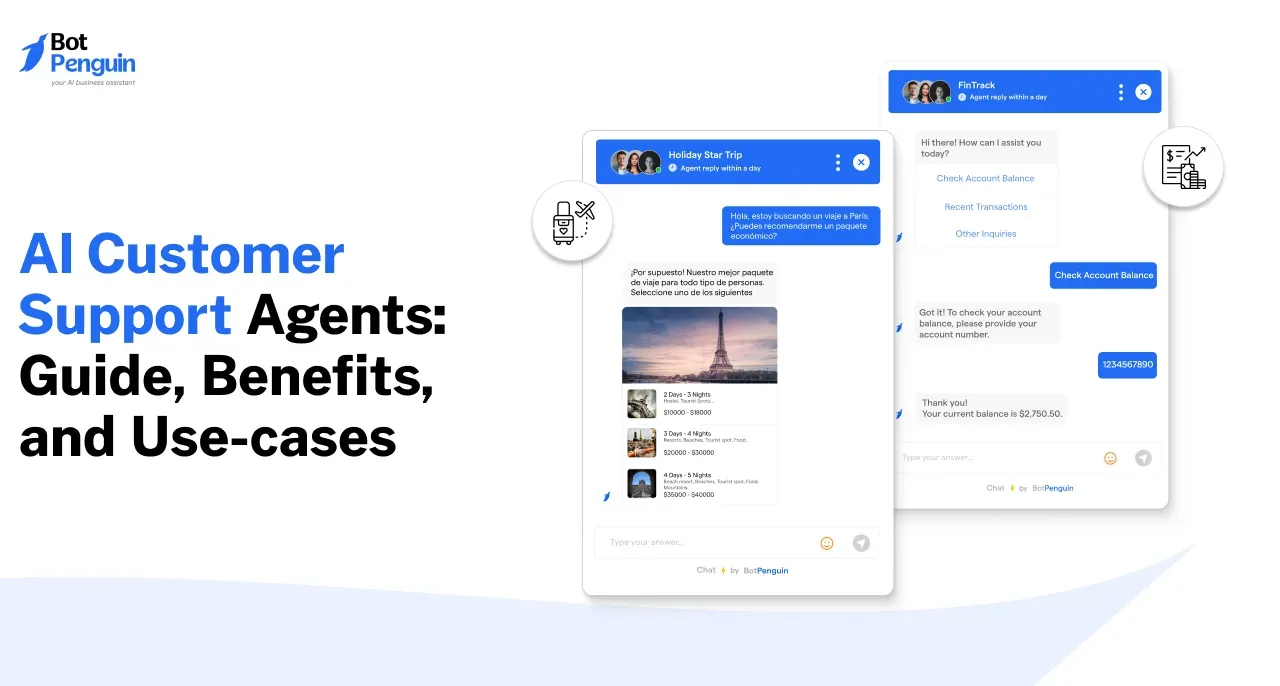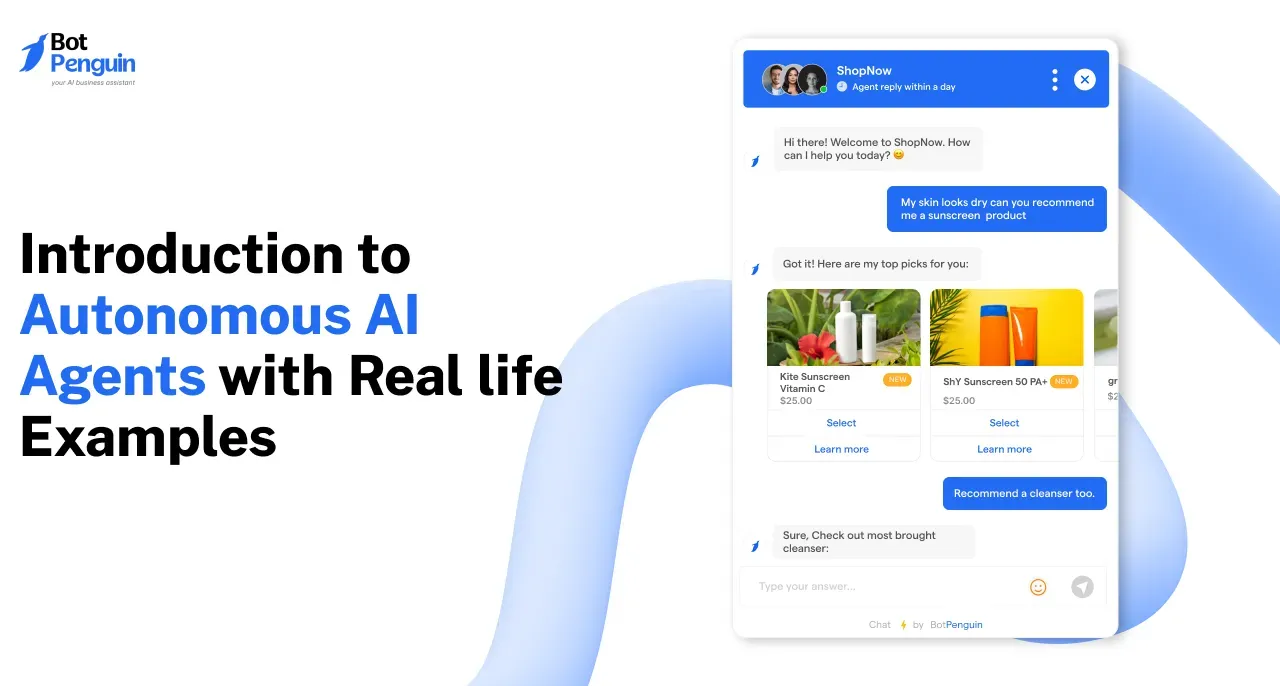Introduction
Autonomous AI agents are proving to be game changers for businesses assisting them in various processes. From streamlining workflows to executing tasks without human intervention, their capabilities are vast.
These autonomous agents can either be simple automated programs or complex machine learning systems that can learn and adapt to dynamic environments. They contain algorithms that allow the agents to analyze data, identify patterns, learn, and make informed decisions.
There are also some of the best free autonomous AI agents available which you can use for your business and enjoy their benefits. Let us get started and explore them.
Factors to Consider Before Choosing Free Autonomous AI Agents
Choosing the right free autonomous AI agents can greatly impact your business operations. While these tools offer efficiency and automation, not all solutions are the same.
Evaluating the right factors ensures you pick an agent that aligns with your needs and supports your goals. Below are the key considerations to help you make the best choice.
Ease of Use
The ease of use is crucial when selecting free autonomous AI agents. Tools that are intuitive and user-friendly save time and reduce the learning period for your team.
Look for platforms with simple interfaces that require minimal training. Also, ensure the setup process doesn’t demand technical expertise or coding skills. A tool that is easy to use allows you to integrate automation into your operations quickly and effectively.
Integration
Your chosen free autonomous AI agents should work seamlessly with the tools you already use. Compatibility with your existing systems ensures smooth data flow and reduces duplication of effort.
Check if the AI agent integrates with popular apps like CRMs, social media platforms, or project management tools. Prioritize solutions that offer prebuilt integrations for common workflows.
Customizability
Flexibility is a key advantage of many free autonomous AI agents. Customization allows you to tailor agents to your specific business needs. Look for agents that offer adjustable workflows, chatbot scripts, or analytics dashboards.
Ensure you can modify settings to align with your branding and processes. Customizability ensures the AI agent adapts to your operations, rather than forcing you to adapt to the tool.
Scalability
As your business grows, your free autonomous AI agents should grow with it. Scalability is essential for ensuring the agent remains useful as your needs evolve.
Assess whether the platform can handle increased data volume, users, or interactions. Check if there are upgrade options for when you outgrow the free version.
Scalable tools save you the trouble of switching platforms later, providing a long-term solution to your automation needs.
Based on all these factors, you can choose the best free autonomous AI agents for your business.
Top 13 Free Autonomous AI Agents for Businesses
Automation is no longer a new term in businesses; it has become the most sought-after process. Also, free autonomous AI agents have helped businesses of all sizes to achieve efficiency and productivity that was once hard to obtain.
These tools handle everything from customer support to lead generation, giving you more time to focus on strategic growth.
Below, we explore some of the most impactful free autonomous AI agents in detail, explaining how each one can benefit your business.
1. BotPenguin
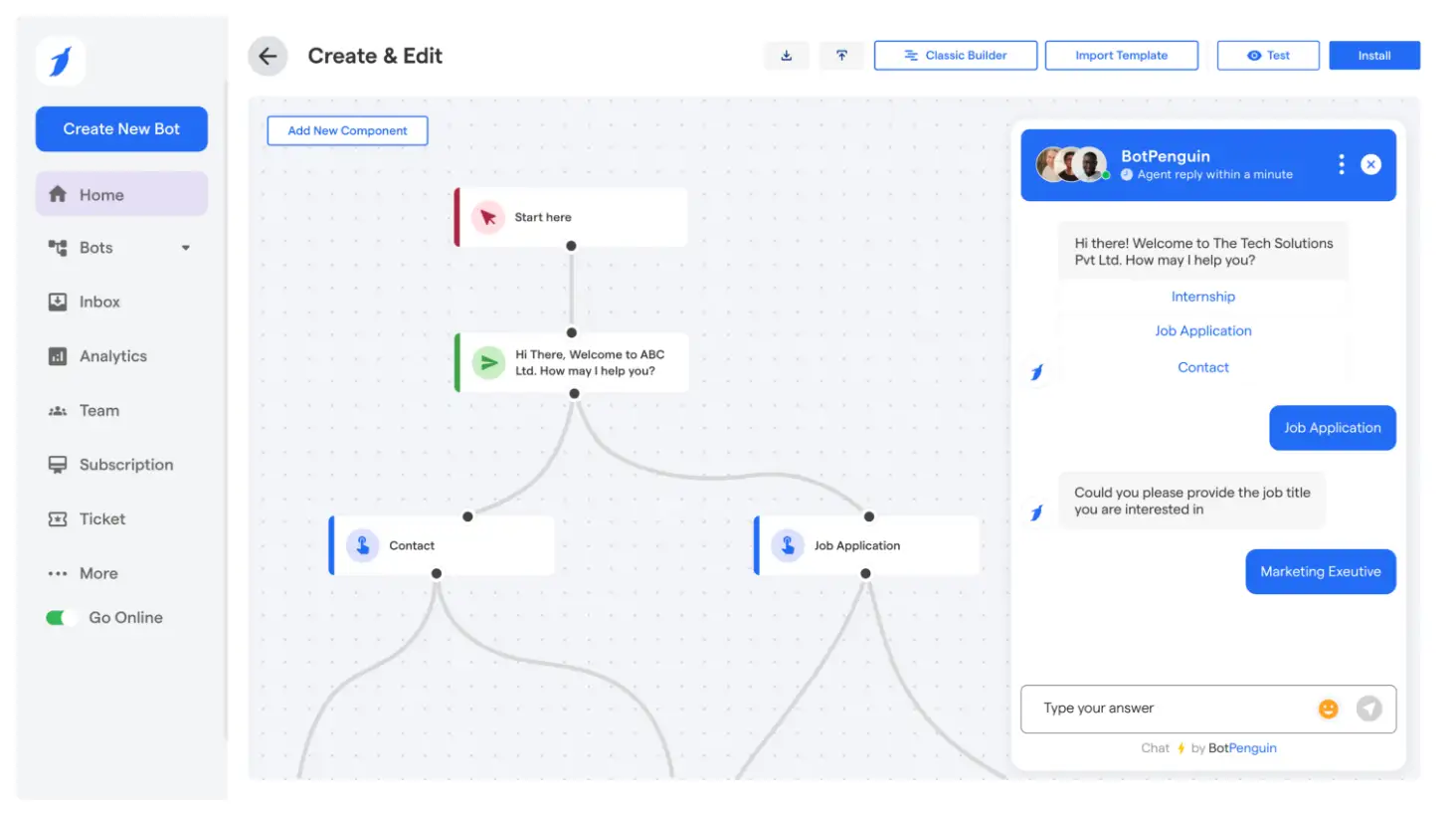
BotPenguin is an AI agent and an intelligent chatbot maker platform that simplifies customer engagement and streamlines lead generation.
Its user-friendly interface and no-code setup make it a favorite among small and medium-sized businesses looking to deliver exceptional customer support seamlessly.
Features
- No coding required: Anyone can create and deploy a chatbot without technical expertise.
- Multi-platform integration: Connects seamlessly to websites, social media platforms like Facebook, Instagram, Telegram, and messaging apps such as WhatsApp, and collaboration tools like Microsoft Teams.
- AI-powered chat flows: Generates dynamic, personalized conversations to address customer queries effectively.
- Analytics: Offers insights into customer interactions, helping businesses improve their communication strategies.
Use Cases
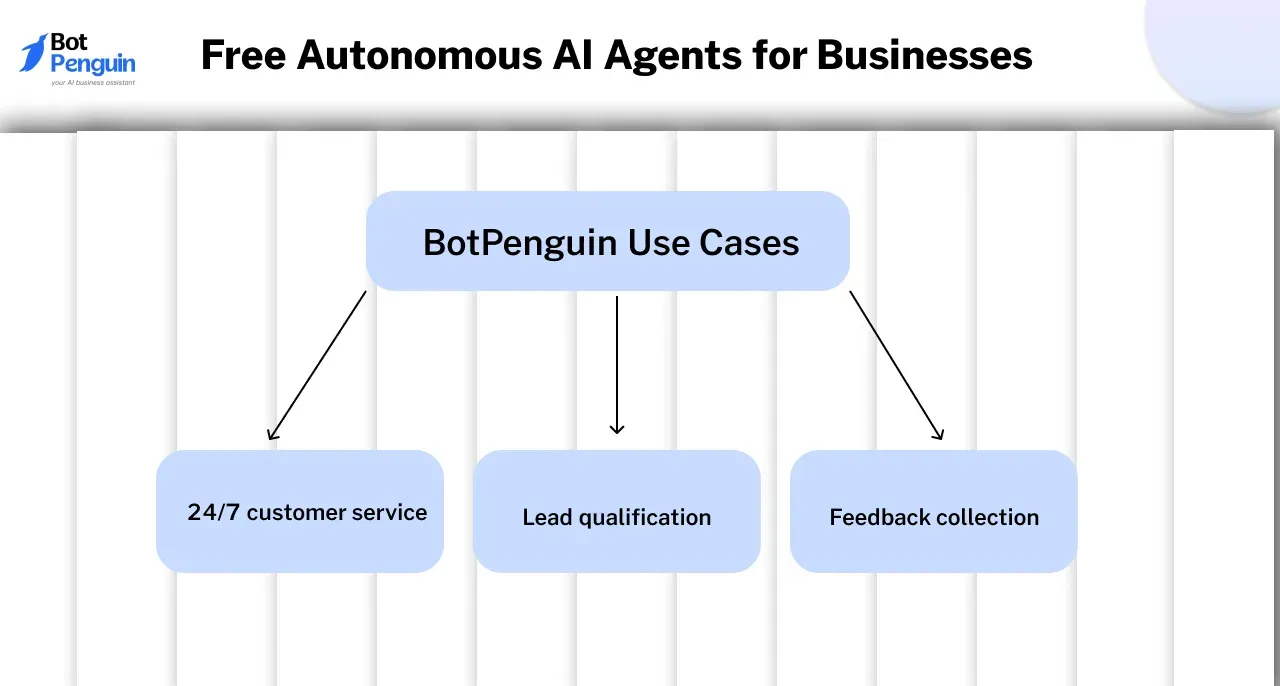
- 24/7 customer service: Automate responses to frequently asked questions, ensuring consistent and round-the-clock support.
- Lead qualification: Use conversational prompts to identify high-quality leads and route them to your sales team.
- Feedback collection: Create automated surveys to gather valuable customer insights.
Pros
- Budget-friendly chatbot solution for small businesses starts for free.
- Supports multilingual interactions, boosting global customer engagement.
Cons
- Offers limited customization options in the free plan.
- Analytics can be challenging for beginners to interpret.
Hence, BotPenguin is a powerful, user-friendly platform that helps businesses automate customer engagement, qualify leads, and gather feedback without any coding, making it a great choice for companies looking for free autonomous AI agents to streamline their operations.
2. Dialogflow
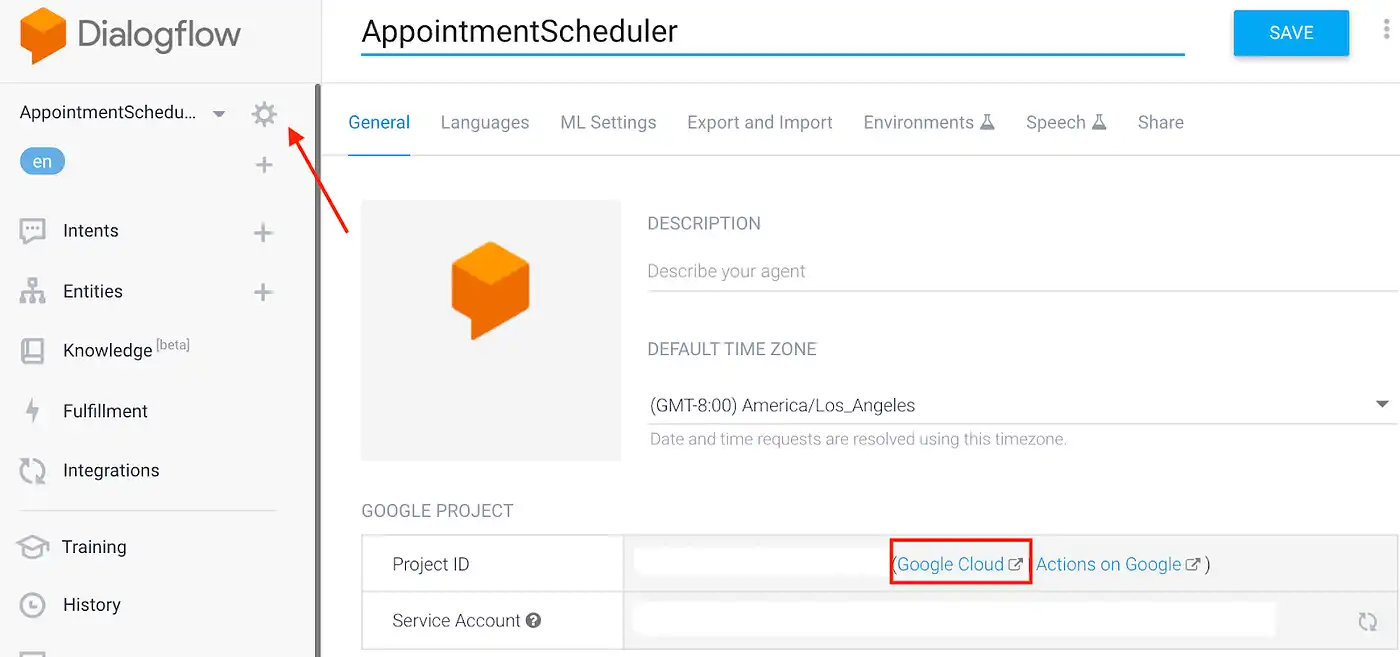
Dialogflow is a natural language understanding platform that helps businesses develop and integrate a conversational interface into mobile apps, web applications, and devices.
It supports text and audio inputs, enabling versatile customer interactions.
Features
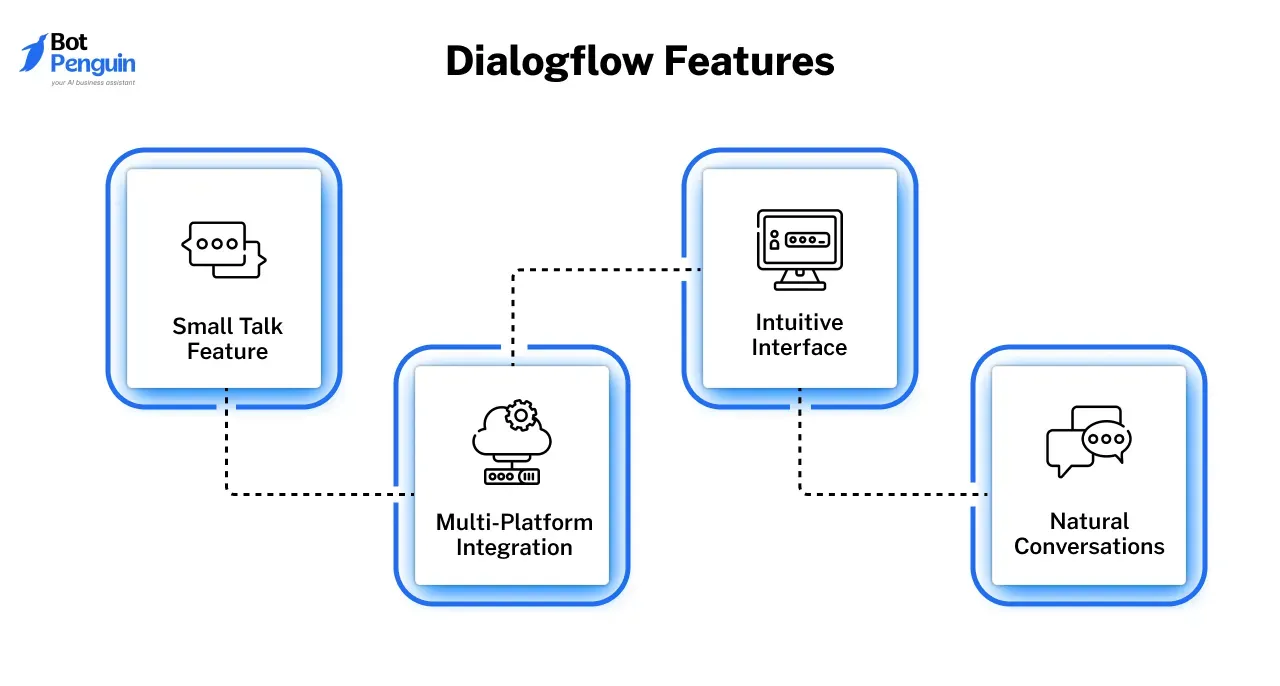
- Small Talk Feature: This is an integrated feature that enhances customer engagement through casual conversations. It can automatically respond to phrases like “How are you?”, “I want to talk”, etc.
- Multi-Platform Integration: You can integrate Dialogflow seamlessly with various platforms like Facebook Messenger, Slack, Skype, and others.
- Intuitive Interface: Dialogflow has a very user-friendly interface that enables you to design and test conversational scenarios efficiently.
- Natural Conversations: The platform allows for natural conversations with users without much effort, thereby making customers feel connected and understood.
Use Cases
- Customer Service: Automate responses to commonly asked questions, providing instant support 24/7.
- Efficient Filtering: Analyzes user inputs and identifies and prioritizes high-quality leads based on predefined criteria.
- Feedback Analysis: Collects and analyzes feedback, ensuring prompt responses to customers.
Pros
- Uses Google's NLP for highly accurate and contextual chatbot interactions.
- Easily connects with Google services for enhanced functionality.
Cons
- Requires technical knowledge for setup and customization.
- Can experience delays in processing complex queries.
Dialogflow offers businesses an intuitive platform for creating natural, conversational interfaces that enhance customer service, automate lead filtering, and analyze feedback, making it a powerful tool for companies seeking free autonomous AI agents to improve customer interactions.
3. OpenDevin
OpenDevin is one of the best free autonomous AI agents that streamlines the software development process by using advanced AI capabilities.
It acts as an autonomous AI software engineer and can carry out complex engineering tasks accurately. This AI agent can not only boost productivity but can also facilitate human-AI collaboration, making it an indispensable tool for developers.
Features
- Autonomous Functioning: Handles several programming tasks autonomously, minimizing the workload on developers.
- Open-Source Flexibility: Allows customization to meet specific requirements and development workflows as it is open-source.
- Multi-Agent Coordination: Supports coordination between multiple AI agents, enabling collaborative problem-solving and efficient task management.
- Integration with Development Tools: Integrates with tools such as shell environments, code editors, and web browsers, allowing AI agents to interact with the development environment similarly to human developers.
Use Cases
- Bug Detection and Resolution: Autonomously identifies bugs within codebases and suggests or implements fixes, enhancing software reliability.
- Software Testing: Generates and executes test cases, ensuring software quality and performance standards are met.
- Automated Code Generation: Generates code snippets or entire modules, reducing manual coding efforts and accelerating development timelines.
Pros
- Regular improvements and feature additions from the open-source community.
- Works on multiple operating systems, increasing accessibility.
Cons
- Requires specific operating systems and software versions for installation.
- Demands significant computational resources, which may not be accessible to all users.
With its advanced AI capabilities and open-source flexibility, OpenDevin is transforming software development by enhancing efficiency, reducing workload, and fostering seamless collaboration between humans and AI.
4. Cubeo AI
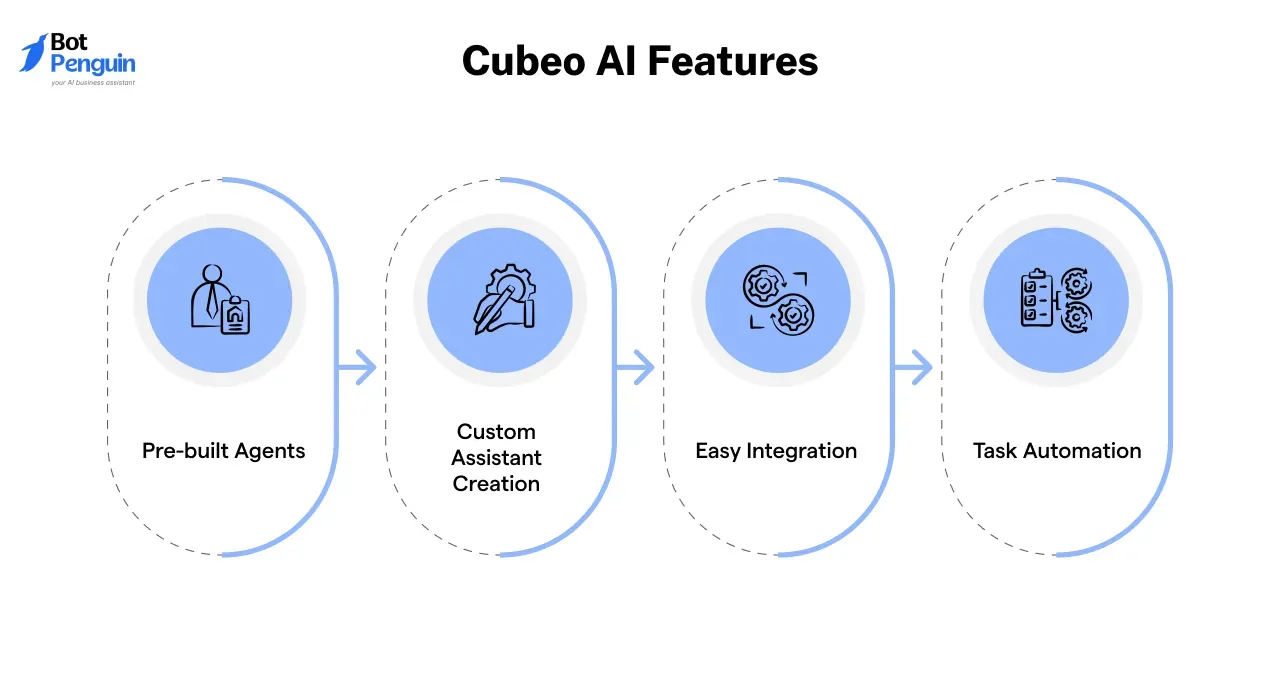
Cubeo AI is a no-code platform that allows businesses to automate routine tasks across various domains like sales, marketing, and human resources.
With the help of advanced LLMs, businesses can simplify their workflows, and increase productivity. As one of the top free autonomous AI agents, it streamlines operations without requiring technical expertise.
Features
- Pre-built Agents: Cubeo AI offers pre-built agents like researchers, and blog writers who can execute tasks effectively.
- Custom Assistant Creation: Businesses can create their own assistants and train them using various formats like PDFs, Docx, etc.
- Easy Integration: This platform can be easily integrated into existing systems and external tools.
- Task Automation: Tasks like CRM updation and web research can be automated, thereby saving time and resources.
Use Cases
- Sales Automation: Handles customer queries, schedule appointments, and streamlines the sales process.
- Content Automation: Automates content creation, optimizes ads, and enhances marketing efforts.
- Competitor Analysis: Identifies and compiles insights and delivers them directly to emails or other apps like Slack.
Pros
- Enables users to build AI assistants without coding skills.
- Simple and intuitive design, making it easy to navigate.
Cons
- May not offer extensive customization for complex needs.
- Requires a stable internet connection for real-time usage.
Cubeo AI allows businesses to automate routine tasks across various departments, enhancing productivity and simplifying workflows.
By using such free autonomous AI agents, businesses can streamline sales, content creation, and competitor analysis, all with easy integration and no-code setup.
5. AutoGPT
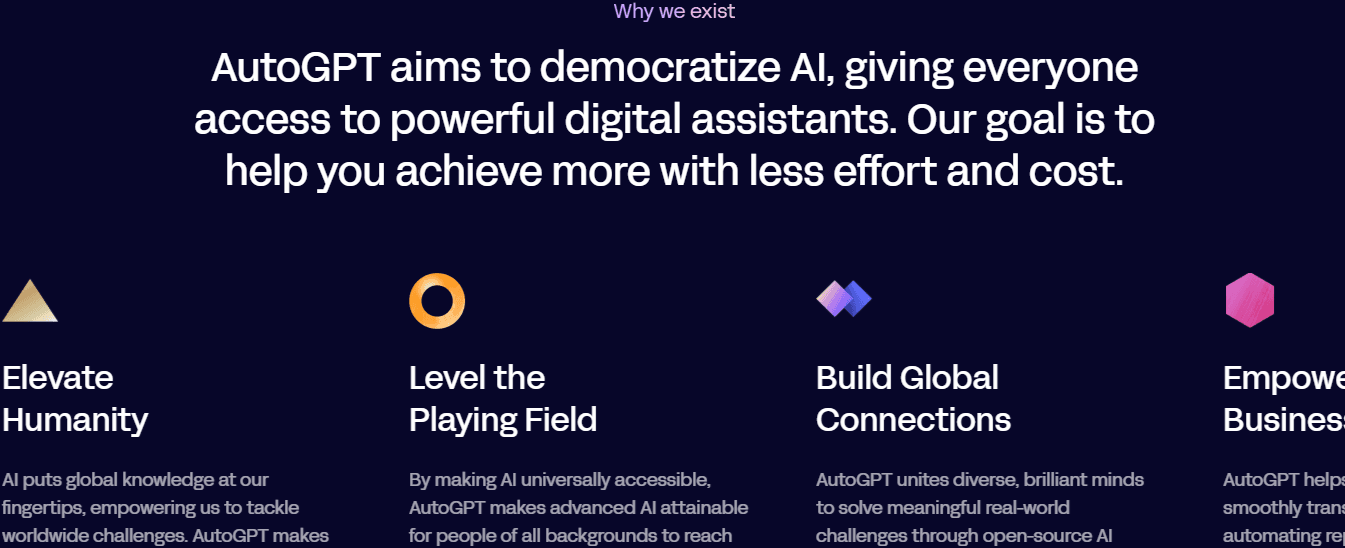
AutoGPT helps businesses optimize operations by automating repetitive tasks such as report generation, data analysis, and customer communications.
It requires minimal technical expertise and enables companies to streamline processes and improve efficiency.
Features
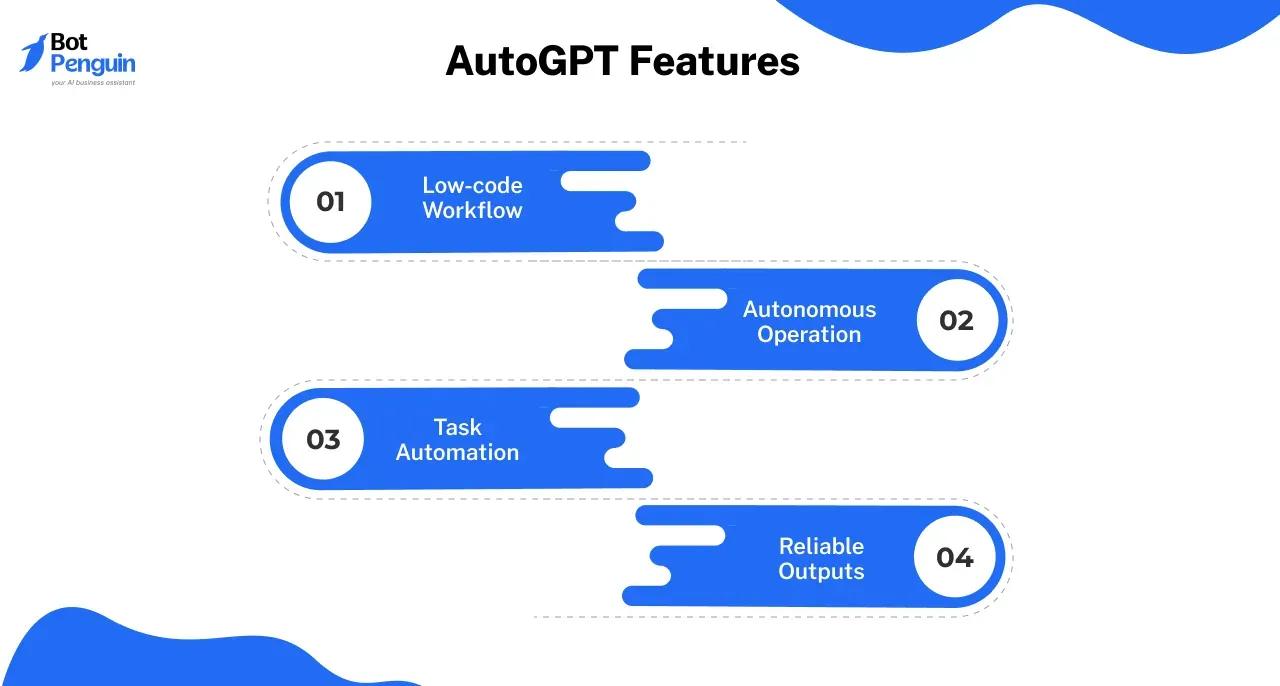
- Low-code Workflow: AutoGPT has a user-friendly interface, allowing businesses to build complex workflows with minimal technical knowledge.
- Autonomous Operation: Operates 24/7 and can trigger tasks automatically without human intervention.
- Task Automation: Automates repetitive tasks like data entry, social media posting, and report generation, thereby saving time and resources.
- Reliable Outputs: Execute tasks consistently and operate around the clock, ensuring smooth operations of businesses.
Use Cases
- Content Creation: Accelerating content processes by automating tasks like outline generation, SEO optimization, and transcribing videos into articles.
- Wide Exposure: Looking for potential customers, sending personalized emails, and effective follow-ups, thereby attracting a broad range of audience effortlessly.
- Data Analysis: Analyzing complex datasets and generating valuable insights quickly, allowing businesses to make informed decisions.
Pros
- Free to use, modify, and contribute to its development.
- Seamlessly integrates with various tools and platforms.
Cons
- Demands significant computational power for optimal performance.
- Relies on external APIs, which can affect functionality if service limits are reached or changes occur.
By using free autonomous AI agents like AutoGPT, businesses can automate critical tasks, enhance decision-making with data insights, and improve customer outreach, all while saving time and resources.
6. BabyAGI
BabyAGI breaks down complex tasks into manageable steps, prioritizes them, and ensures efficient execution.
With its dynamic learning capabilities, it helps businesses achieve goals and streamline operations effectively.
Features
- Problem Solving: BabyAGI possesses dynamic learning abilities and excellent problem-solving abilities which can be very useful for businesses.
- Task Management: Handling tasks efficiently, tracking tasks, and adding new tasks seamlessly.
- Task Prioritization: Determines the order in which tasks should be executed ensuring seamless operation of processes.
- Dynamic Learning: Can learn and adapt to new information effectively.
Use Cases
- Task Automation: Automates complex tasks like responding to customer inquiries promptly.
- Data Analysis: Analyzes data effectively. For example, in healthcare, it evaluates patient information and helps in providing better patient care.
- Natural Language Processing: Using natural language processing and machine learning, BabyAGI can adapt and learn from previous actions.
Pros
- Allows users to tailor its capabilities for specific needs.
- Can work with external APIs and platforms.
Cons
- Best suited for small to medium-sized tasks.
- Requires basic programming knowledge.
Utilizing free autonomous AI agents such as BabyAGI enables businesses to automate processes, optimize decision-making, and enhance overall operational performance, driving growth and efficiency across various functions.
7. AutoGen
AutoGen enables businesses to build applications where multiple autonomous AI agents collaborate to achieve complex tasks.
By using advanced conversational patterns and seamless workflows, AutoGen enhances productivity and supports a variety of business needs.
Features
- Customization: Allows businesses to customize agents for specific tasks or domains and they can engage in natural language interactions with humans enabling better conversations with customers.
- Code Execution: Generates, executes, and debugs codes while working to solve a problem which can help businesses greatly during software development tasks.
- Collaboration: Performs autonomously and can also hand off tasks smoothly to human agents when required enabling businesses to provide appropriate responses to customers.
- Flexible Workflow: Enables complex workflow designs where multiple agents work together to handle intricate challenges.
Use Cases
- Automated Task Solving: Multiple agents work together to solve complex tasks. For example, in customer service, one agent can understand the context, another can search for information, and the third agent can respond; All these can be achieved in a coordinated manner.
- Efficient Data Analysis: Processing large datasets, recognizing patterns, and providing valuable insights for businesses.
- Complex Experiments: Integrating multiple agents and LLMs enables the exploration of new ideas and carrying out complex experiments thereby helping businesses in innovation.
Pros
- Supports diverse conversation patterns for complex workflows.
- Seamlessly integrates with advanced large language models and external tools.
Cons
- Struggles with intricate tasks like web scraping and complex code development.
- Can get trapped in error-fixing loops during debugging sessions.
With the help of free autonomous AI agents like AutoGen, businesses can automate intricate tasks, improve collaboration, and drive innovation, ultimately optimizing their processes and boosting efficiency.
8. Paradigm AI

Paradigm AI helps businesses by automating data collection, analysis, and decision-making processes.
With its intuitive interface and advanced AI algorithms, it streamlines operations and ensures efficient management of complex tasks.
Features
- Data Management: Automated data collection and analysis by embedding AI agents.
- Decision-Making: Advanced AI algorithms can operate even in resource-constrained environments helping businesses to make immediate decisions.
- Intuitive Interface: An intuitive chat interface with dedicated agents to assist businesses in automating routine tasks.
- Enhanced Security: Protects sensitive data and adheres to compliance standards enabling businesses to operate at ease.
Use Cases
- Task Automation: Automating the extraction of data and complex datasets thereby allowing organizations to improve efficiency and accuracy in handling data.
- Streamlining Processes: Providing valuable customer insights to businesses enabling them to streamline their operations.
- Effortless Context Provision: With an advanced prompt system and access to organization documents, businesses can provide context without much effort and time.
Pros
- Provides full visibility into AI decision-making processes, enhancing trust and reliability.
- Allows for human oversight and intervention in AI processes when needed.
Cons
- May require significant setup and customization for optimal use.
- Users may need time and training to adapt to AI-driven workflows and tools.
Businesses can use free autonomous AI agents such as Paradigm to enhance operational efficiency, streamline data processes, and make informed decisions with ease, all while ensuring the security and compliance of their data.
9. Open Interpreter
Open Interpreter is an autonomous AI agent that enables developers to run large language models (LLMs) on their local machine and execute code through natural language commands.
It allows businesses to perform tasks such as data analysis, generating and editing images, videos, and PDFs, as well as analyzing large datasets.
Features
- Autonomous Code Execution: Allows LLMs to autonomously run code in various programming languages, including Python, JavaScript, and Shell, directly on the user's local environment.
- Natural Language Interface: Enables users to interact with their computer's functionalities using natural language commands, streamlining complex tasks such as data analysis, file manipulation, and web research.
- Data Management and Analysis: Provides robust capabilities for working with data. You can use it to clean, process, and analyze large datasets, streamlining workflows for data science tasks such as statistical analysis, data manipulation, and visualizations.
- Web Automation: Automates web browsing, allowing users to control a web browser (such as Chrome) to perform tasks like web scraping, data collection, form filling, or interacting with online services.
Use Cases
- System Automation: Automate repetitive tasks like data cleaning, system monitoring, and file conversion by running scripts.
- Personalized Workflows: Create custom commands to execute specific actions based on your requirements, tailoring your computer interactions to suit your needs.
- File management: Organize files, create new folders, move files based on criteria, search for specific files, and delete unwanted files using simple commands.
Pros
- Runs code directly on your computer, enhancing privacy and control.
- Offers flexibility to tailor system messages and model settings to individual needs.
Cons
- Effectiveness depends on the clarity and precision of user commands.
Potential security risks if not used cautiously with proper safeguards.
Open Interpreter simplifies everyday tasks by allowing users to interact with their computers through natural language commands, making complex processes more efficient and accessible for everyone, from developers to businesses using free autonomous AI agents.
10. Devika AI
Devika AI allows businesses to solve complex problems and streamline processes by providing innovative solutions.
It uses AI-powered code generation to interpret any high-level instructions and convert them into actual code.
The agent has advanced capabilities in machine learning, natural language processing, and computer vision, enabling businesses to automate tasks and enhance efficiency across various industries.
Features
- Intelligent Task Planning and Adaptation: Breaks down complex tasks into achievable steps and refines its approach based on the latest information.
- Natural Language Processing (NLP): Enables sentiment analysis, entity recognition, language translation, and document summarization, allowing businesses to extract valuable insights from unstructured text data.
- Automated Decision-Making: Facilitates automated decision-making processes, allowing organizations to automate routine tasks, optimize resource allocation, and make data-driven decisions.
- Integration and Scalability: Seamlessly integrates with existing systems and technologies; It is also highly scalable, accommodating growing data volumes and user demands, ensuring flexibility as business needs evolve.
Use Cases
- Medical Diagnosis and Prognosis: Analyzes patient records, lab results, and imaging scans, aiding healthcare professionals in diagnosing diseases accurately and predicting patient outcomes.
- Fraud Detection and Prevention: Enhances fraud detection by analyzing transaction data to identify anomalous patterns and suspicious activities, enabling businesses to mitigate risks and prevent fraudulent transactions.
- Personalized Recommendations: Analyzes customer information and product attributes to provide personalized recommendations, enhancing customer engagement and boosting sales.
Pros
- Offers a comprehensive toolkit for solving complex problems and automating tasks.
- Provides access to a rich library of pre-trained models for various tasks.
Cons
- Subject to frequent updates, impacting stability and usability.
- Users may face challenges in understanding how to effectively utilize Devika’s capabilities.
By integrating advanced capabilities, Devika AI serves as a versatile tool for businesses looking to enhance their operations.
Through automation, intelligent decision-making, and scalable solutions, free autonomous AI agents like Devika AI are transforming how organizations tackle complex tasks.
11. Open Assistant
Open Assistant is a perfect option for businesses seeking free autonomous AI agents to carry out a wide range of tasks through natural language processing (NLP) and machine learning.
Its primary focus is on delivering intelligent, context-aware interactions across various business functions.
Features
- Contextual Conversations: Excels at understanding the context of a conversation and providing coherent, meaningful responses over multiple interactions.
- Customizable Workflow: Can be tailored to meet specific business needs by adjusting its responses and behavior based on defined parameters.
- Multi-Domain Functionality: Handles various types of tasks, such as customer support, sales, and basic workflow automation, by integrating into business environments.
- Open-Source: Businesses have full access to modify the assistant, making it adaptable to a wide range of use cases without any licensing fees.
Use Cases
- Customer Service: Automate customer interactions by answering FAQs, guiding users through troubleshooting, or providing basic support.
- Sales Support: Engage with potential leads and provide initial qualifications or information to help move them down the sales funnel.
- Content Creation: Assist with content creation by providing automated writing assistance, offering creative inspiration and brainstorming ideas, and summarizing interview transcriptions.
Pros
- Strong community support.
- No licensing costs.
Cons
- May require significant setup for advanced features.
- Lacks advanced task automation capabilities.
Open Assistant enhances user interactions with its customizable and context-aware capabilities, making it a powerful tool for businesses looking to streamline communication and improve customer engagement.
12. MetaGPT
MetaGPT helps businesses optimize their software development processes by improving collaboration between human teams and AI agents.
With its advanced features, it allows organizations to streamline project delivery, enhance decision-making, and boost productivity through task management and decomposition.
Features
- Efficient Task Completion: Allocation of more agents to manage complex tasks effectively.
- Role Definition: Assigning specific roles to each agent allowing them to perform productively.
- Task Decomposition: Spilts complex tasks into smaller, achievable parts thereby meeting the required goals.
- Process Standardization: Provides a standardized process for all agents to follow.
Use Cases
- Enhanced Customer Support: Offers effective and personalized customer interactions thereby improving customer engagement.
- Content Creation: Generates drafts, suggests edits, and provides valuable insights which helps to boost the creative process.
- Decision-Making: Helps businesses make informed decisions and implement stringent strategies with MetaGPT's analytical abilities.
Pros
- Encourages unique ideas and perspectives.
- Considers different viewpoints for comprehensive solutions.
Cons
- Requires significant data, raising privacy issues.
- Not designed to efficiently modify existing codebases.
By utilizing free autonomous AI agents such as MetaGPT, businesses can optimize their workflows, improve team collaboration, and streamline decision-making processes, all while ensuring efficient project delivery and superior outcomes.
13. Aomni
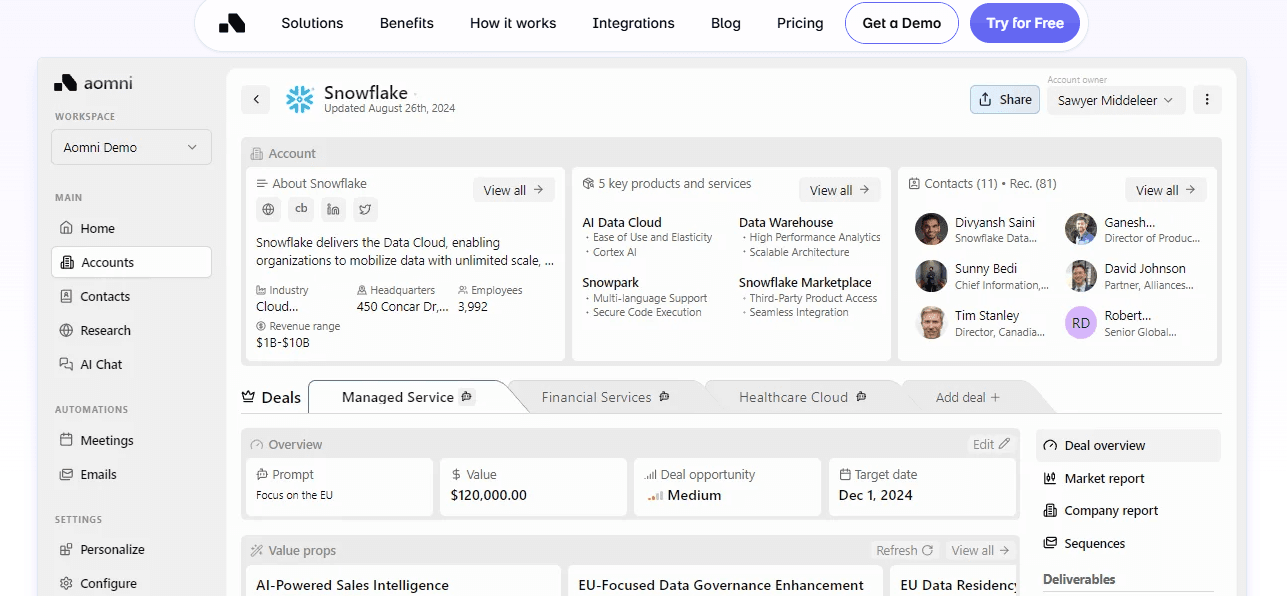
Aomni helps businesses streamline workflows and enhance customer engagement.
With its user-friendly interface, it empowers organizations to optimize their sales processes, improve lead scoring, and create personalized experiences for their customers.
Features
- Seamless Integration: Allows for easy integration into existing systems.
- Targeted Engagement: Helps create personalized messages for each prospect within minutes, thereby attracting a wide range of customers.
- Efficient Lead Scoring: Assigns scores to leads and prioritizes them based on their chances to convert, thereby optimizing sales efforts.
- Enhanced Response: Training the agent with links to websites, and internal documents which can help them to provide accurate responses to customers.
Use Cases
- Enhanced Customer Engagement: Allows to analyze the interactions of customers deeply which helps to refine engagement strategies and boost customer satisfaction.
- Detailed Report Generation: Provides detailed reports on sales performance and market trends which helps to make informed decisions and optimize strategies.
- Predictive Analysis: Using predictive analysis, forecasts sales trends and market dynamics enabling businesses to create effective marketing campaigns.
Pros
- Improves customer interaction strategies.
- Supports team collaboration and shared insights.
Cons
- Requires time and expertise for configuration.
- Requires high computing power.
Businesses can use Aomni’s advanced features, such as predictive analysis and detailed report generation, to make data-driven decisions, enhance their customer relationships, and drive sales growth with efficiency and precision.
How to Use These Free Autonomous AI Agents Effectively?
Adopting free autonomous AI agents can transform how you run your business, but their effectiveness depends on how you use them.
To get the most out of the agents, it is essential to approach automation with a clear plan and strategy. Below are some actionable steps to ensure these agents work effectively for your business.
Start Small
Begin with one or two free autonomous AI agents that address specific pain points in your business. Focus on tasks that are repetitive or time-consuming, such as email responses or data syncing.
Test their performance and identify areas for improvement before expanding to more tools. Starting small allows you to adapt gradually and ensures smooth integration of these free autonomous AI agents into your existing workflows.
Set Clear Goals
Define what you want to achieve with free autonomous AI agents. It may be to reduce response times or improve customer engagement.
Identify key metrics to track, like time saved or customer satisfaction rates. Align your goals with business priorities to ensure the agents deliver measurable value.
Automation works best when guided by specific objectives. Clear goals give your automation strategy direction and help you measure success effectively.
Monitor Performance
Regularly evaluating how well your agents perform is critical. Track metrics like task completion rates, error reductions, or response times.
Use built-in analytics from your free autonomous AI agents to identify areas for optimization. Adjust workflows or settings as needed to improve performance and align with your goals.
Ongoing monitoring ensures that your free autonomous AI agents remain efficient and adapt to your changing needs.
Join Communities
Participating in user groups and forums can provide valuable insights. Connect with other users of free autonomous AI agents to share tips, troubleshoot issues, and discover new features. Many agents have official communities or forums where you can ask questions and get expert advice.
Learning from experienced users can help you unlock the full potential of these free autonomous AI agents. Communities are a great resource for staying updated and getting support when you need it.
When you follow these steps, you can enjoy the complete benefits these free autonomous AI agents provide and take your business to the next level.
Conclusion
Automation is a powerful ally for businesses aiming to save time and enhance efficiency.
By using free autonomous AI agents, businesses can simplify repetitive tasks, engage customers more effectively, and focus on growth. As we have seen, choosing the right tools and using them strategically can make a significant difference.
Among the many options available, BotPenguin stands out as a practical starting point. As a no-code AI chatbot platform, it enables businesses to automate customer interactions seamlessly. With BotPenguin, you can take the first step toward smarter, more efficient business operations.
Frequently Asked Questions (FAQs)
How do free autonomous AI agents benefit businesses?
Free autonomous AI agents save time, reduce operational costs, and improve accuracy in tasks like customer service, lead generation, and data management, enabling businesses to focus on strategic growth and innovation.
Which industries can use free autonomous AI agents?
Free autonomous AI agents are versatile and can be used across industries like e-commerce, healthcare, education, finance, and marketing to optimize processes and enhance customer experiences.
What are the key features to look for in free autonomous AI agents?
Look for features like ease of use, integration with existing tools, scalability, and customizability to ensure that these free autonomous AI agents align with your business needs and grow with your operations.
Are free autonomous AI agents reliable for business operations?
Yes, free autonomous AI agents are reliable for automating standard tasks. However, evaluating their performance, security, and compatibility with your workflows is essential to ensure they meet your business requirements.
How do I get started with free autonomous AI agents?
Start by identifying repetitive tasks in your business. Choose one or two free autonomous AI agents that align with your goals. Test them, monitor performance, and gradually integrate them into your workflows for maximum efficiency.


